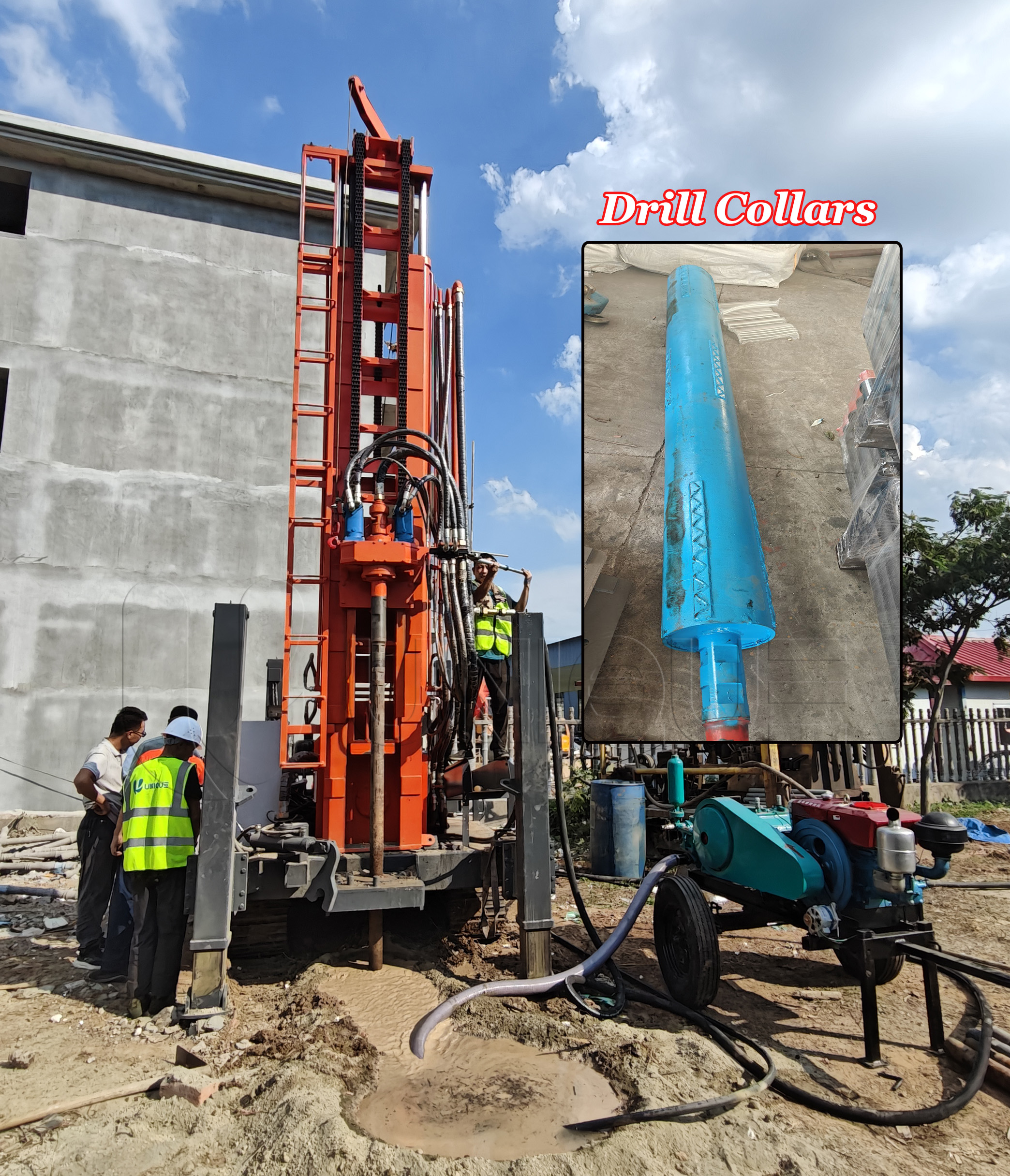What is the Purpose of Drill Collars in Drilling?
In drilling operations—whether for oil drilling, geological exploration, or water well drilling—drill collars are indispensable core components. As the “load-bearing main force” and “stabilizer” of the drill string, their design and performance directly affect drilling efficiency, safety, and cost control. Especially in water well drilling rig operations, where crews face complex and variable formations (such as clay layers, sand-gravel layers, and hard rock layers), the role of drill collars becomes even more critical.
Key Functions of Drill Collars
1. Providing Sufficient Weight to the Drill String for Effective Bit Rock Breaking
During drilling, the bit requires sufficient “downward pressure” to penetrate underground rock formations (especially hard soil layers and rock layers common in water well drilling). Drill collars, made of high-strength alloy steel, are much heavier than ordinary drill pipes. Their core function is to provide downward pressure to the drill string through their own weight, allowing the bit to continuously and efficiently break rocks or soil.
Without the weight provided by drill collars, the bit may “slip” due to insufficient pressure, which not only prolongs drilling time but also causes excessive wear on the bit, increasing operational costs.
2. Enhancing Drilling Stability to Ensure Wellbore Verticality
Water well drilling rig has extremely high requirements for wellbore verticality—an inclined wellbore may prevent subsequent casing from being lowered smoothly, and even affect the water yield and service life of the water well.
Drill collars are usually connected at the bottom of the drill string, adjacent to the bit. With their high rigidity and heavy weight, they act like “stabilizer bars” to reduce bending and shaking of the drill string. They balance the reaction force generated by the bit when breaking rock formations, ensuring the drill string drills vertically along the preset direction and effectively preventing wellbore deviation.
3. Reducing Drilling Vibration to Protect Equipment and Improve Efficiency
During drilling, intense friction between the bit and rock formations generates high-frequency vibration. This vibration not only accelerates wear (or even breakage) of the bit and drill pipes but also affects the stability of drilling parameters (such as rotation speed and pressure), reducing drilling efficiency.
The high density and rigidity of drill collars give them excellent “vibration absorption capabilities”—they absorb part of the vibration energy through their own mass, reducing the transmission of vibration to the entire drill string. This protects drilling equipment (especially precision measuring instruments), extends their service life, and maintains a stable drilling rhythm.
4. Preventing Bit Sticking to Reduce Operational Risks
In water well drilling, if encountering loose sand-gravel layers, highly cohesive clay layers, or formations with uneven hardness, the bit is prone to being “stuck” (i.e., bit sticking). Bit sticking not only interrupts operations but, in severe cases, may cause drill string breakage, resulting in huge economic losses.
By providing continuous and stable downward pressure, drill collars help the bit pass through complex formations more “smoothly”: avoiding the bit from sinking too deep in soft formations and ensuring it has enough force to break through hard formations. This reduces the risk of bit sticking and ensures operational continuity.
5. Assisting in Drilling Depth Control to Adapt to Deep Well Operation Needs
As the depth of water well drilling increases (such as in deep groundwater extraction), the length of the drill string increases accordingly, and formation pressure and friction also increase significantly. At this point, ordinary drill pipes struggle to withstand huge axial loads and torque, but drill collars, with their high strength and heavy weight, can provide reliable “support” for deep drilling.
They ensure that the bit can still obtain sufficient downward pressure at depths of hundreds or even thousands of meters, maintaining a stable drilling speed, thereby precisely controlling drilling depth and meeting the exploration and extraction needs of deep water wells.

Why Choose UNIQUE Drill Collars?
As a professional manufacturer of water well drilling rigs and supporting components, UNIQUE’s drill collars are forged from high-strength alloy materials, undergo precision machining, and strict quality inspections. They are better adapted to the complex working conditions of water well drilling in terms of weight control, rigidity design, and wear resistance. Whether for shallow civilian wells or deep industrial wells, UNIQUE drill collars can help you improve drilling efficiency and reduce equipment loss through optimized downward pressure transmission, stable vibration reduction, and anti-sticking design—making every well drilling safer and more efficient.
If you want to learn more about drill collar selection or supporting components for water well drilling rigs, please contact the UNIQUE technical team. We will provide you with customized solutions.

